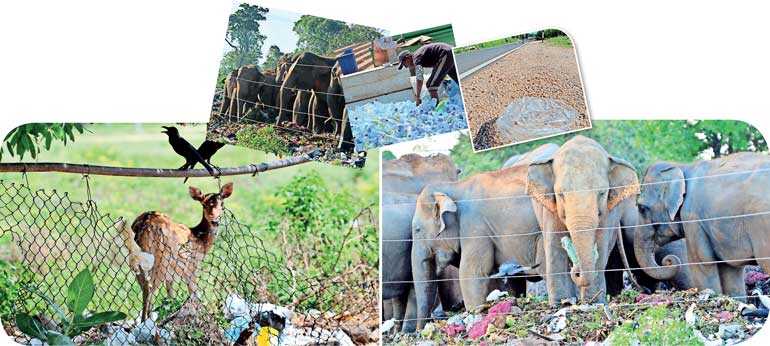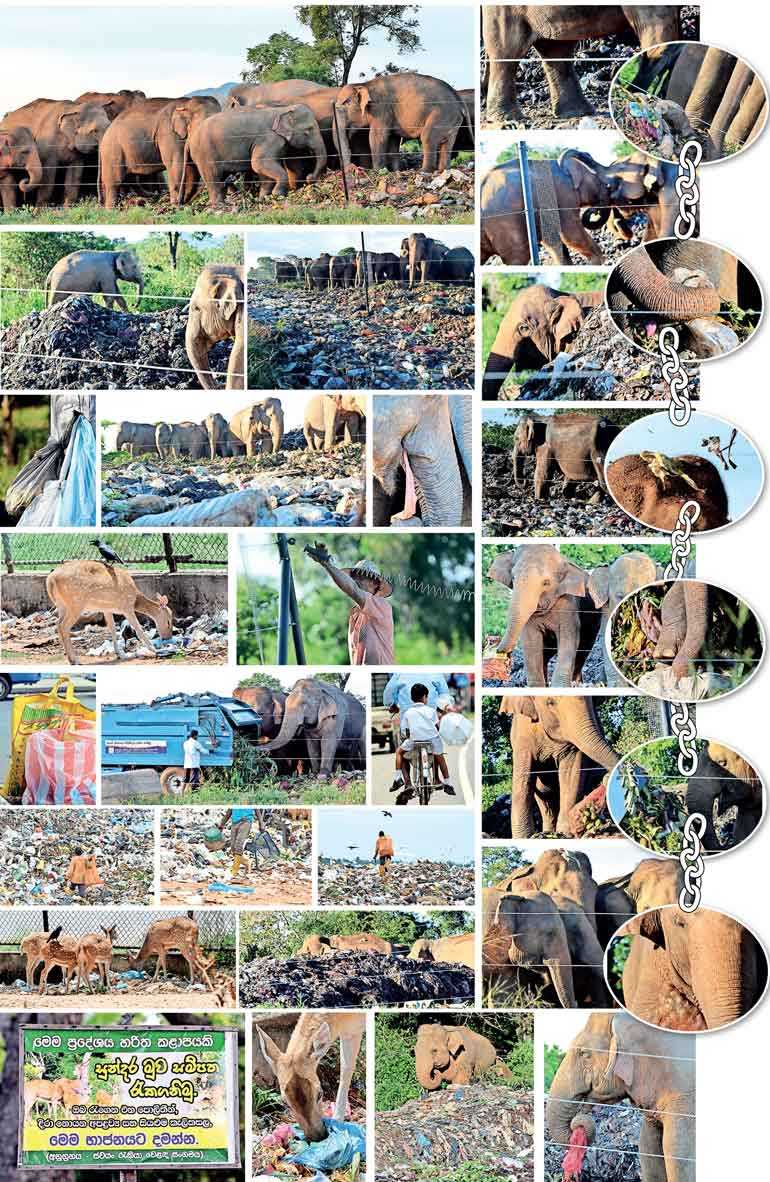Saturday Feb 14, 2026
Saturday Feb 14, 2026
Saturday, 26 May 2018 00:43 - - {{hitsCtrl.values.hits}}

Text and pix by Shehan Gunasekara
At the start of civilisation, humans lived in harmony with nature because their needs were limited. Since primitive man did not have the means to change his environment dramatically to suit his own needs, it was possible for him to coexist with the environment.
However, the rapid advancement of technology, which reached its peak through the industrial revolution in the 18th and 19th centuries and subsequent globalisation saw this balance shift dramatically because technology gave humans the chance to expand their needs exponentially and with it the ability to bend the environment to a population’s multitudinous needs.
Technology gave the human population a chance to take resources from the environment and mass produce for its needs. The modern economic system thrived on using technology to create new consumption trends on a scale that was never before witnessed by human history.
The creation of plastic products, particularly polythene use, became ubiquitous, under these circumstances. These incredible levels of consumption resulted in garbage mountains. Billions of tonnes of waste were being released to the environment with no thought as to what colossal environmental damage would be caused.
Much of this waste is non-biodegradable and while nature is equipped to deal with some level of wastage, the environment simply cannot cope with the large amounts of waste produced by humans.
Waste released to rivers and oceans is causing untold harm. Many types of fish and birds ingest or choke on the plastic and die. This is especially harmful to endangered species, as many as 94% of aquatic birds are found with plastic in their stomachs.
To reduce this carnage, several countries around the world have banned disposing waste into the sea. Australia banned plastic bags in 2003 in an effort to save its migrating dolphins. Since then many other countries have joined in this plastic ban for different reasons.
The Philippines, Bangladesh and Cameroon banned single use plastic bags because of the drainage problems they cause, resulting in floods. In Texas plastic bags were banned to protect their cattle farms. European countries have been at the forefront of the battle against the bag.
Denmark introduced a special tax on people using plastic bags in 1994, leading to usage dropping from 800 million to 400 million. In Ireland special efforts to reduce the use of plastic bags from 2001-2011 saw consumption dropping by as much as 90%. The European Union is on target to reduce usage by 80% next year.
 Developing countries are not far behind. Kenya, after a decade of attempts, finally passed a law against polythene use last year. Currently they have the toughest penalties for anyone caught manufacturing plastic bags. Offenders could be fined $40,000 or handed a four-year prison sentence if they are caught selling, manufacturing or distributing plastic bags. The plastic industry in Kenya protested against the ban arguing that 80,000 jobs would be lost but the Government took the side of the environment.
Developing countries are not far behind. Kenya, after a decade of attempts, finally passed a law against polythene use last year. Currently they have the toughest penalties for anyone caught manufacturing plastic bags. Offenders could be fined $40,000 or handed a four-year prison sentence if they are caught selling, manufacturing or distributing plastic bags. The plastic industry in Kenya protested against the ban arguing that 80,000 jobs would be lost but the Government took the side of the environment.
Karnataka, in Sri Lanka’s neighbouring India, also constituted a plastic ban in 2016 but given that plastic usage was still legal in other parts of the country it had limited effect. Earlier this year Jammu and Kashmir and Maharashtra became the latest States to roll out their own plastic bans.
As elsewhere, Sri Lanka also has its share of garbage mountains. The Meethotamulla tragedy in 2017 where 33 people lost their lives did not result in the sea change that was initially expected.
The Dambulla economic zone still releases all its unsold fruits and vegetables to the nearby Digampathana sanctuary along the Dambulla-Habarana road. Even before the tractors arrive with their loads, dozens of elephants have lined up waiting for their meal. Some of them reach into the tractors and pick out fruits packed inside plastic bags and consume them.
The eventual death of these elephants is a tragedy that could be easily averted by sorting and packing the leftover vegetables and fruits without plastic but even this small measure is overlooked by the responsible parties.
A group of deer in Trincomalee were also seen consuming garbage by the roadside. Once ingested plastic will eventually kill these animals. This is just the tip of a dangerous iceberg where irresponsible human consumption has paved the way for us all to pay too high a price.
On 5 June Sri Lanka will celebrate World Environment Day along with the rest of the world and this is a positive thing. But we have to work harder to ensure that genuine and tangible solutions are found for the country’s waste problems.
Consistent engagement on this issue and using public pressure to force the Government and other stakeholders to listen to public demands and ensure that public funds are used for this incredibly important effort is the best way to celebrate World Environment Day.
Where do we stand?
We stand in a culture of “use once and dispose”.
